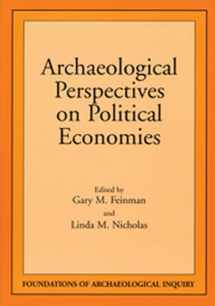
Archaeological Perspectives on Political Economies (Foundations of Archaeological Inquiry)
ISBN-13:
9780874807776
ISBN-10:
0874807778
Edition:
First Edition
Author:
Gary Feinman, Linda M. Nicholas
Publication date:
2004
Publisher:
University of Utah Press
Format:
Paperback
439 pages
FREE US shipping
Book details
ISBN-13:
9780874807776
ISBN-10:
0874807778
Edition:
First Edition
Author:
Gary Feinman, Linda M. Nicholas
Publication date:
2004
Publisher:
University of Utah Press
Format:
Paperback
439 pages
Summary
Archaeological Perspectives on Political Economies (Foundations of Archaeological Inquiry) (ISBN-13: 9780874807776 and ISBN-10: 0874807778), written by authors
Gary Feinman, Linda M. Nicholas, was published by University of Utah Press in 2004.
With an overall rating of 4.5 stars, it's a notable title among other
books. You can easily purchase or rent Archaeological Perspectives on Political Economies (Foundations of Archaeological Inquiry) (Paperback) from BooksRun,
along with many other new and used
books
and textbooks.
And, if you're looking to sell your copy, our current buyback offer is $0.51.
Description
Archaeological Perspectives on Political Economies explores past societies that are characterized by hierarchical organization where the production and circulation of goods transcend domestic units. Based on contributions to the biennial Foundations of Archaeological Inquiry Roundtable, Gary Feinman and Linda Nicholas bring together twelve leaders in the field whose contributions consider such questions as the emergence of rank within a previously egalitarian society, the regional organization of preindustrial economic systems, different modes of craft specializations, and the relation between high-status consumption and long-distance trade.Areas of study include most of the core areas of early complex society development, and analytical scales that range from domestic units to macroregional networks, demonstrating how archaeological research and data can help explicate the economic intricacies of past societies. The volume reinvigorates the archaeological investigation of preindustrial economies, offering both new theoretical perspectives and new empirical foundations.


We would LOVE it if you could help us and other readers by reviewing the book
Book review

Congratulations! We have received your book review.
{user}
{createdAt}
by {truncated_author}


